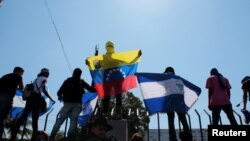A report submitted to the UN human rights council this week accuses Nicaragua of continuing to repress, threaten and harass human rights defenders and other opponents one year after the government’s violent crackdown on nationwide demonstrations.
More than 300 people were killed, 2000 injured, and hundreds arbitrarily arrested during last year’s violent repression of peaceful nationwide protests. More than 70,000 people also fled into exile to escape the heavy-hand of the Nicaraguan government.
U.N. Deputy High Commissioner for Human Rights, Kate Gilmore, says peaceful protests and dissent continue to be repressed in Nicaragua. She says more than 440 imprisoned protestors have been released, but more than 80 remain in custody under severe conditions.
“Our Office has received allegations that some of them were subjected to torture or ill-treatment by correction officers. . . . We are deeply concerned that human rights defenders and community leaders continue to be targets of attacks, of threats, harassment and constant surveillance," Gilmore said.
Gilmore says people are deprived of the right to freedom of expression, including freedom of the media. She says journalists and other media workers are threatened, harassed and censored. She notes two prominent journalists were detained for more than five months under terrorism charges.
She urges the government of President Daniel Ortega to engage in a genuine and meaningful dialogue to address people’s legitimate demands for justice and reparation.
Nicaragua’s Ambassador to the United Nations in Geneva, Carlos Ernesto Morales Davila dismisses the charges as ill-founded. He says human rights defenders are not persecuted. They can freely promote and defend human rights. However, he accuses some of these groups of perverting their cause and engaging in destructive activities.
He says they are trying to destroy the constitutional order of the country and to undermine the work of the government to restore peace and reconciliation.





